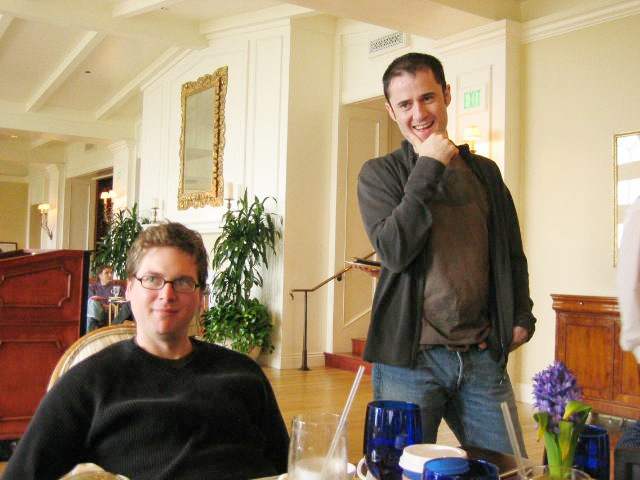On October 15, 2014 Twitter will celebrate its first year of being listed on the New York Stock Exchange. While founder Evan William remains with the company as chairman, the other co-founders have seemingly moved on to different projects.
Jack Dorsey founded Square and has been busy helping small business owners with funding through Square Capital. And, then there’s Biz Stone, who launched Jelly. Biz Stone does have a successful history of launching successful companies, and Jelly may end up another one of his successes.
 Image Source: Wikipedia Commons
Image Source: Wikipedia CommonsBiz found early success as the Creative Director of the journaling platform Xanga, and eventually his Boston-based blogging company Genius Labs, which was acquired by Google in 2003. During this time he began exchanging emails with another person who had experience getting acquired by Google – Evan Williams.
This lead to Stone to Silicon Valley, where he helped develop Blogger. Stone would then leave Google to join Odeo with Williams, Jack Dorsey, and Noah Glass. Odeo, of course, would become Twitter on March 21, 2006.
As Twitter became increasingly popular, it was Stone who was the face of the company. In fact, he even starred in a Stoli Vodka commercial. It was also Stone who infamously came up with the $500 million price tag for Mark Zuckerberg to purchase Twitter in 2008 (when he said yes, they decided not to sell).
Stone told The Boston Globe a few months later:
“We admire and respect Facebook. We are big fans, actually. They approached us, and we took it seriously. But we feel like we want to continue this path we’re on—sustaining this innovation—and the time is not right.”
Stone left Twitter in 2011, and has remained extremely busy. He’s an angel investor who has backed companies like Square, Nest Labs, and Medium. He also launched a new startup called Jelly.
The startup scene isn’t the only thing he’s been involved in. Stone has also made his directorial debut with Canon and Ron Howard for a short film for Project Imaginat10n. Additionally, in April 2014, he released his third book Things A Little Bird Told Me: Confessions of the Creative Mind.
But, when Twitter’s IPO filing was released a year ago – October 4, 2013 to be exact – Stone was MIA. This prompted Kevin Roose from NYMag to ask “Where Is Biz Stone?”
One year later, Biz still remains out the spotlight, for the most part. While he’s definitely keeping himself busy – he hasn’t done much press since the release of Things A Little Bird Told Me- his Jelly app could find still success as the “Tinder of” search.
So let’s learn more about the man who has been named the 2009 Nerd of the Year by GQ magazine alongside Evan Williams, one of the Most Influential People in The World by Time magazine, Entrepreneur of the Decade by Inc. magazine, and one of Vanity Fair‘s Top Ten Most Influential People of the Information Age.
1. From Christopher to Biz
What kind of parent would name their child Biz? While, not The Stones. Biz’s actual name is Christopher Isaac Stone. However, according to a post on his official blog, while trying to phonetically ear his name through his father’s Boston accent, he thought he heard his name pronounced as “Biz-ah-bah.”
Fast forward several years to a birthday party when his friend overheard his mom call him “Biz,” which was the shortened version of “Biz-ah-bah” and the name stuck.
2. He Was Inspired by Wile E. Coyote
Stone was in a serious rut in 2002. His first startup, Xanga, was fledgling, and he was in severe credit card debt, so he left New York City and moved into his mother’s basement in Wellesley, Massachusetts. Despite these difficult time, Stone continued to blog. In fact, Biz has stated that the “only bright spot in my life was blogging”. In an article written for Wired, Stone goes on to say that:
“Written in a spirit of total, almost hallucinogenic confidence, my blog was my alter ego. It was a fictional creation that began with the title, inspired by an old Bugs Bunny cartoon guest-starring Wile E. Coyote. In one scene, the perpetually clever coyote says, “Permit me to introduce myself,” then presents a business card to Bugs with a bit of pomp. It reads: ‘My name is Wile E. Coyote, Genius.'”
So, Biz named his blog, and printed up business cards that read: “Biz Stone, Genius.” And, the rest as they, is history.
3. Was a College Dropout, Now He’s a Fellow
Biz didn’t drop-out of college once, but twice from the Northeastern University and the University of Massachusetts, Boston. However, that didn’t prevent some high-level universities from inviting Stone to advise. In 2011, Stone discussed entrepreneurship and innovation to M.B.A. students at the University of California at Berkeley’s Haas School of Business.
Today, Stone “teaches master classes in business and his quixotic brand of idealism” at the distinguished Oxford University. He also embarks with students at Oxford’s Said Business School advice on how to start and lead a successful business. Some of his tips include being emotionally engaged with what you do, sticking to your core values, and being fluid with your career.
4. He’s Got Friends in High Places
When Biz’s startup Jelly closed on it’s Series A funding with Spark Capital and SV Angel on May 16th 2003, there were some very high-profile investors. This “bloom,” which is what a group of jellies is called, included:
- Jack Dorsey, Co-founder and CEO of Square
- Bono, Musician and Activist
- Reid Hoffman with the Greylock Discovery Fund
- Steven Johnson, Author and Entrepreneur
- Evan Williams and Jason Goldman via Obvious
- Al Gore, Politician, Philanthropist, Nobel Laureate
- Greg Yaitanes, Emmy Winning Director
- Roya Mahboob, Afghan Entrepreneur and Businesswoman
These investors were selected because they shared Jelly’s “optimistic worldview and believe in our vision.” The official announcement went on to state:
“We chose angels like Al Gore, a Partner at KPCB and Chairman and Co-founder of Generation Investment Management, Greg Yaitanes, a Hollywood director, and Roya Mahboob, an entrepreneur doing amazing work for women in Afghanistan partly because they work in divergent fields. Knowledge diversity is something we prize highly and is also something that will be represented in our product.”
What’s interesting is that even before the idea was pitched, Biz shared the idea with his Twitter co-founders Evan Williams and Jack Dorsey, who both believed that it was a “great idea”.
5. Believes Conscious Capitalism Will be the Future
Biz has made no secret that he donates a good portion of his wealth to help support education, poverty, the environment, health, and animal welfare by founding or supporting organizations like DonorsChoose, Product (RED), and the Biz & Livia Stone Foundation. However, Stone believes that conscious capitalism will become the norm.
In an interview with NBC News, Biz stated the tagline for Jelly is ‘Jelly helps people,’ which began immediately after the app was launched. Jelly teamed up with Product (RED) to convert thank-you cards into dollar donations to help with the fight of AIDS in Africa. He goes on to explain that:
“So, the future of marketing is philanthropy. There’s potentially a way that your company, your product, your service, aligns itself with something meaningful in this world, and attracts not just more consumers who are seeking more meaningful choices, but better employees who are attracted to this more meaningful type of work. So, I am seeing it happen. I am definitely making it happen with Jelly. And there is data out there that is suggesting that companies who do good do well.”
6. Feels Social Networking Will Help Humans Cooperate With Each Other
When Biz returned to SXSW to promote his book earlier this year – which was the first time he’s been there since Twitter stole the show in 2007 – he was asked by CNN for his thought on the future of social networking.
“In the future, what do I think will happen? I think we’ll be able to accomplish in one year what used to take 100 years. Because when people get together and coordinate, they can do amazing things.”
Have you used Jelly yet? If so, do you think that the product is good to find success? Or, do you think that there’s too much hype around its famous founder and investors?
Featured Image: Wikipedia Commons




